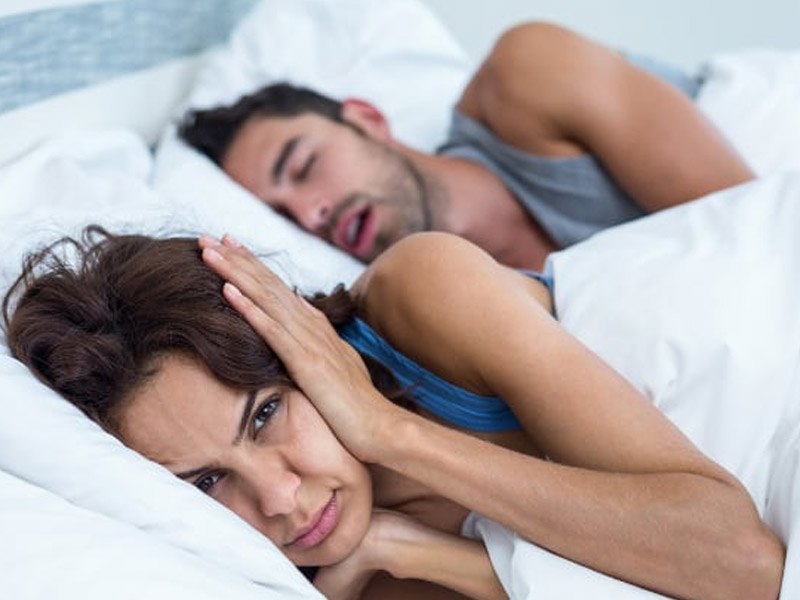Sleep Apnea Treatment Near You
If you have problems getting a good night’s sleep, it could be from a sleep disorder called sleep apnoea.
Sleep apnea is a sleep disorder in which breathing repeatedly stops and starts again throughout the night, causing significant disruptions to sleep. Sleep apnea can sometimes become serious due to the impact it has on breathing. Loud snoring, insomnia and having trouble breathing are all frequently seen with this common condition.
There are two types of sleep apnea. The most common type is obstructive sleep apnea. This is when the throat muscles become so relaxed during sleep that part of the airway becomes closed off. This type of sleep apnea can occur at any age but is typically more common in middle-aged males. Central sleep apnea is a much rarer type of sleep apnea. This occurs when your brain doesn’t actually send the correct signals to the muscles that control breathing.
If you are seeking personalized and compassionate dental care, look no further. Call us at 604-260-1894 to schedule your appointment with our dentist in Vancouver and experience the difference with Inspire Dental Group.
Symptoms
If you think you have sleep apnea, there are a few different symptoms that you might be experiencing.
You could be experiencing the following symptoms at night:
- Loud snoring
- Gasping for air during your sleep
- Insomnia
You could be experiencing these symptoms during the day:
- Morning headaches
- Waking up with a dry mouth
- Sleepiness and difficulty focusing during the day
- Irritability

Causes
When you are in a deep sleep, the muscles in your throat relax. For someone suffering from sleep apnea, the throat muscles will relax so much that part of their airway closes off.
They keep trying to breathe, but no air enters the lungs, reducing the oxygen in the blood and waking the person. They will usually be unaware that they have woken and return to sleep, which is when the cycle repeats and re-occurs – constantly throughout the night.
There are many factors that can contribute to sleep apnea, including:
- Muscular changes
- Physical obstructions such as excess fat storage around the airway
- Brain function
There are also some common risk factors that contribute to sleep apnea, including sleeping on your back, chronic sinusitis, menopause or recent weight gain.
Other risk factors may include:
- Obesity
- Large neck circumference, large tonsils or large adenoids
- Down syndrome
- Being a smoker
There are many factors that can contribute to sleep apnea, including:
- Muscular changes
- Physical obstructions such as excess fat storage around the airway
- Brain function
There are also some common risk factors that contribute to sleep apnea, including sleeping on your back, chronic sinusitis, menopause or recent weight gain.
Other risk factors may include:
- Obesity
- Large neck circumference, large tonsils or large adenoids
- Down syndrome
- Being a smoker
FAQ
There are a few different ways you can treat it. You can start by making a few lifestyle changes, including stop smoking, regularly exercising, losing weight and reducing your alcohol intake. There are also dental appliances that can help treat sleep apnea. These help to hold the jaw and tongue in a particular position to help keep the airway open. These will need to be fitted by a dentist or orthodontist.
It can be possible to prevent sleep apnea. Trying to change sleeping positions, such as sleeping on your side as opposed to on your back, can help.
Stopping smoking and reducing alcohol intake, particularly a few hours before bed, can also help with prevention. Regular exercise and weight loss are also beneficial.
It is also important to take good care of your oral health with a combination of at-home dental care and building a great relationship with your dentist.
We recommend daily healthy habits and regular visits to the dentist. For optimum oral health:
- Practice good oral hygiene habits at home including brushing your teeth twice a day and flossing once a day
- Book hygiene visits with dental hygienist at least twice each year
- Book routine exam and x-rays visits with your dentist once each year
There are a few symptoms of sleep apnea, some more common than others. People who suffer from sleep apnea will usually be frequent snorers, have trouble sleeping and find themselves feeling irritable or sleepy during the day. People with sleep apnea may also experience headaches in the morning and a dry mouth when they wake up.
Sleep apnea can cause you frustration at night and throughout the day. Most of these problems are annoying, however, sleep apnea can also lead to more serious issues. If left untreated, sleep apnea could lead to the risk of more serious conditions, including heart disease, high blood pressure and diabetes. Sleep apnea dental appliances, or surgery, might be the best option for you if you are concerned about the risks associated with sleep apnea. If you book an appointment to see your dentist or orthodontist, they will discuss the options available to you.

